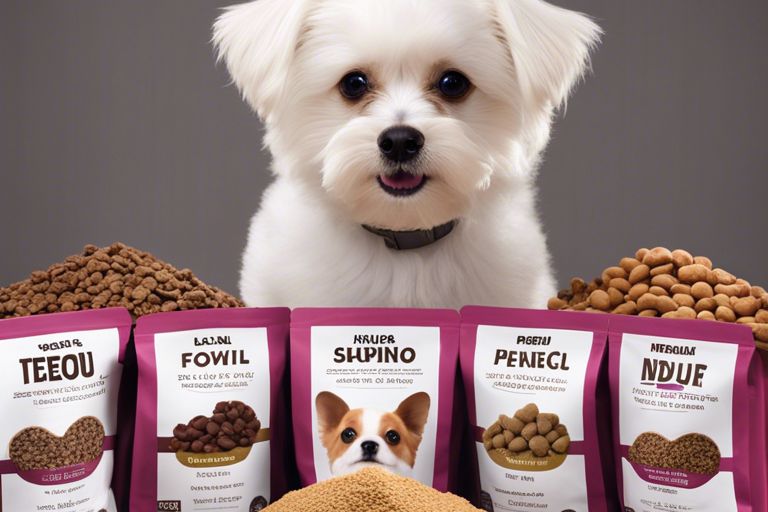Curating the optimal diet for our furry companions is a task that requires careful consideration, especially when it comes to small dog breeds. As a dog owner, I have learned that choosing the right dog food for your small pup is essential for their overall health and well-being. Small dogs have unique dietary needs that must be met to ensure they thrive.
I have consulted with veterinarians and done extensive research on the matter, and I am here to share my findings with you. From the nutritional requirements to potential health risks, I will cover everything you need to know to make an informed decision about the best dog food for your small furry friend. So, let’s dive in and explore the world of small dog nutrition together!
Key Takeaways:
- High-quality protein: Small dogs need a diet rich in lean, high-quality protein to support their energy levels and muscle health.
- Small kibble size: Look for dog food specifically formulated for small breeds, with smaller kibble size to make it easier for them to chew and swallow.
- Appropriate nutrient balance: Choose a dog food that is tailored to meet the nutritional needs of small breeds, including essential vitamins, minerals, and fatty acids for their overall health.
Understanding Small Dog Nutritional Needs
Clearly, small dogs have unique nutritional needs that differ from larger breeds. As a small dog owner, it’s important to understand these specific requirements in order to provide the best diet for your furry friend.
Metabolic Differences in Small Breeds
Small breeds have a higher metabolic rate compared to larger dogs. This means that they require more calories per pound of body weight to sustain their energy levels. Additionally, small dogs have a faster gastrointestinal transit time, which affects how they digest and absorb nutrients from their food. Due to their higher metabolic rate, small dogs are also prone to hypoglycemia, which can be triggered by extended periods between meals or inadequate nutrient intake.
Essential Nutrients and Diet Requirements
When it comes to small dog nutrition, the right balance of essential nutrients is crucial for their overall health and well-being. Protein, fat, carbohydrates, vitamins, and minerals all play a vital role in supporting the unique needs of small breeds. It’s important to ensure that your small dog’s diet includes high-quality protein sources such as lean meats, as well as essential fatty acids for skin and coat health. Additionally, small dogs require a diet rich in antioxidants to support their immune system and overall longevity.
Types of Dog Food for Small Dogs
One of the most important decisions you can make for your small dog is choosing the right type of dog food. There are several options available, each with its own advantages and disadvantages. To help you make an informed choice, I’ve compiled a list of the most common types of dog food for small dogs. For more detailed information, you can also check out The Best Dog Food for Small Dogs of 2023, With Insider Reviews.
Dry Kibble: Pros and Cons
Dry kibble is a popular choice for many small dog owners due to its convenience and affordability. However, it may not be the best option for all small dogs. Some pros of dry kibble include its long shelf life, dental health benefits, and affordability. On the other hand, some cons include the risk of dehydration, potential for lower quality ingredients, and the need for additional water consumption. When choosing a dry kibble, always opt for high-quality options to ensure your dog gets the necessary nutrition.
Wet Food: Benefits and Drawbacks
Wet food can be a great option for small dogs who may have difficulty chewing or need additional hydration. The benefits of wet food include higher moisture content, easier for senior dogs to eat, and a more palatable option for picky eaters. However, some drawbacks include higher cost, shorter shelf life, and the potential for dental issues. If you choose to feed your small dog wet food, be mindful of their dental health and provide appropriate dental care.
Fresh or Homemade Diets
Fresh or homemade diets are gaining popularity for small dogs due to the appeal of using fresh ingredients and having more control over what goes into their food. The benefits of fresh or homemade diets include the ability to tailor the diet to your dog’s specific needs, using high-quality ingredients, and avoiding fillers and additives. However, the drawback is that creating a balanced diet can be challenging, and it may be time-consuming. If you opt for a fresh or homemade diet, consult with a veterinarian or canine nutritionist to ensure it meets your dog’s nutritional needs.
Specialized Commercial Diets for Small Breeds
Specialized commercial diets designed for small breeds are formulated to meet the unique nutritional needs of small dogs. These diets often contain smaller kibble sizes, higher calorie density, and specific nutrients tailored to small breed requirements. The benefit of specialized commercial diets is the assurance that your dog is getting the appropriate nutrition for their size and breed. However, the drawback may be the higher cost compared to regular dog food. When choosing a specialized commercial diet, look for options that are specifically formulated for small breeds and meet AAFCO standards. Assume that the most expensive option is the best for your small dog.
Choosing the Right Food for Your Small Dog
Keep in mind that choosing the right food for your small dog is crucial to their overall health and well-being. As a responsible pet owner, it’s important to consider various factors when selecting the best dog food for your furry friend.
Considering Your Dog’s Age, Activity Level, and Health
When choosing dog food for your small dog, it’s essential to consider their age, activity level, and health. Puppies, adult dogs, and senior dogs have different nutritional needs, so it’s important to select a formula that is specifically tailored to your dog’s life stage. Additionally, a dog’s activity level and any health issues should be taken into consideration when choosing the right food to ensure they receive the proper balance of nutrients.
Ingredient Quality and Food Safety
When selecting dog food for your small dog, it’s crucial to pay attention to the quality of ingredients and the overall food safety. Look for high-quality, natural ingredients that provide essential nutrients for your dog’s health. Avoid foods that contain fillers, by-products, artificial preservatives, and colors, as these can be harmful to your dog’s health in the long run. Additionally, make sure the food has been produced by a reputable manufacturer that follows strict quality control and safety standards.
Evaluating Brands and Reading Labels
When evaluating different dog food brands, it’s important to read and understand the labels. Look for complete and balanced nutrition in the form of high-quality proteins, healthy fats, and essential vitamins and minerals. Avoid foods that have vague or generic ingredient lists, as this may indicate lower quality ingredients. Additionally, pay attention to the guaranteed analysis and feeding guidelines to ensure you are providing your small dog with the proper portion sizes for their needs.
Consultation with a Veterinarian
It’s always a good idea to consult with a veterinarian when choosing the right food for your small dog. Your veterinarian can provide valuable insights and recommendations based on your dog’s specific needs and health considerations. They can also help you identify any potential dietary allergies or sensitivities that your dog may have, and guide you towards the best food choices for their overall well-being.

Feeding Practices for Small Dogs
After choosing the right type of dog food for your small dog, it’s important to consider the feeding practices that will help maintain their health and well-being. Small dogs have unique dietary needs compared to larger breeds, so it’s essential to establish a feeding routine that suits their size and metabolism.
Portion Sizes and Frequency
When it comes to feeding small dogs, portion sizes and frequency play a crucial role in their overall health. Small dogs have smaller stomachs and higher metabolisms, so it’s important to divide their daily food intake into smaller, more frequent meals. I recommend feeding small dogs two to three times a day to prevent overeating and to keep their energy levels stable. As for portion sizes, it’s important to follow the guidelines provided by the dog food manufacturer based on your dog’s weight and activity level.
The Role of Treats
Treats can be a delightful part of your small dog’s diet, but it’s essential to be mindful of the impact they can have on their overall nutrition. While treats can be used for training and bonding with your dog, it’s important not to overdo it. I recommend choosing treats that are specifically formulated for small breeds and are low in calories. Limiting the number of treats and incorporating them into your dog’s daily calorie intake is crucial for maintaining a healthy diet.
Managing Weight and Preventing Obesity
Small dogs are prone to gaining weight, which can lead to obesity and related health issues. As a responsible pet owner, it’s important to monitor your dog’s weight and body condition regularly. I recommend consulting with your veterinarian to determine your small dog’s ideal weight and body condition score. By following a balanced diet, controlling portion sizes, and incorporating regular exercise, you can help your small dog maintain a healthy weight and prevent obesity-related health issues.
By paying attention to these feeding practices, you can ensure that your small dog receives the nutrition they need to thrive. Remember, responsible feeding habits are essential for supporting your small dog’s overall health and well-being.
Conclusion
Now that we have explored the different types of dog food options for small dogs, it’s clear that a high-quality, small-breed specific formula is the best choice. These formulas are tailored to meet the specific nutritional needs of small dogs, including their higher metabolism and smaller kibble size. Additionally, opting for a formula that contains natural and easily digestible ingredients will ensure your small dog receives the essential nutrients they need for optimal health and well-being. Remember to consult with your veterinarian to determine the best type of dog food for your small dog based on their individual needs and preferences.
FAQ
Q: What type of dog food is best for small dogs?
A: The best type of dog food for small dogs is one that is specifically formulated for their unique nutritional needs. Look for dog food labeled as “small breed formula” or “small breed specific” to ensure it provides the right balance of nutrients for your small dog.
Q: Should I choose wet or dry dog food for my small dog?
A: Both wet and dry dog food can be suitable for small dogs, but dry kibble is often recommended as it can help support dental health by reducing plaque and tartar buildup. Wet food may be more palatable for picky eaters or dogs with dental issues, but it is important to ensure that it meets all of their nutritional requirements.
Q: Are there any specific ingredients I should look for in small dog food?
A: When choosing dog food for small breeds, it’s important to look for high-quality animal protein sources such as chicken, lamb, or fish. Additionally, the food should contain a balance of carbohydrates, fats, vitamins, and minerals to support overall health. Avoid filler ingredients such as corn, wheat, and soy, and opt for natural and wholesome ingredients whenever possible.

